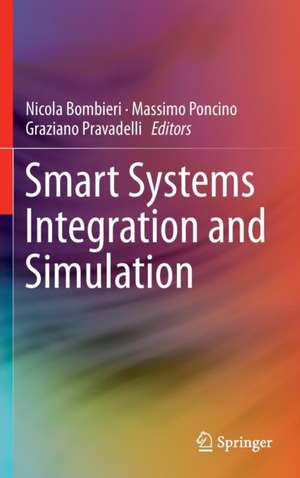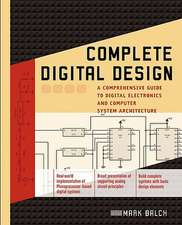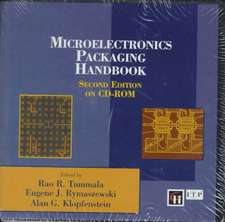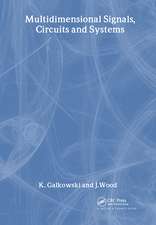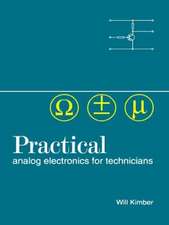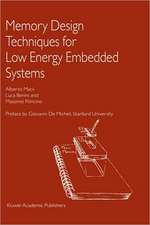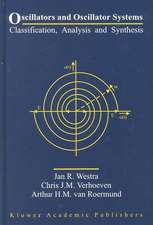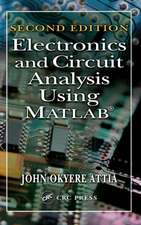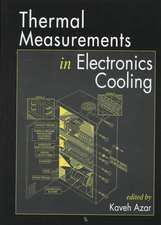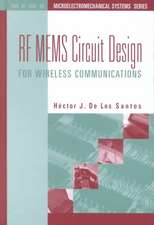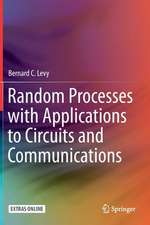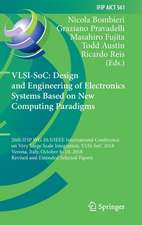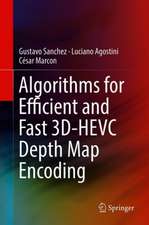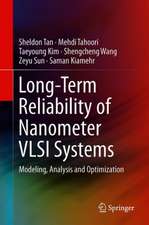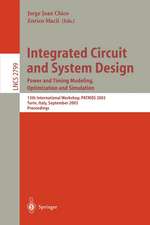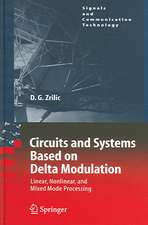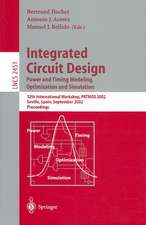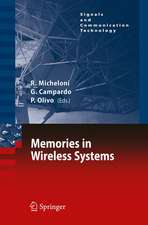Smart Systems Integration and Simulation
Editat de Nicola Bombieri, Massimo Poncino, Graziano Pravadellien Limba Engleză Hardback – 2 mar 2016
By covering theoretical and practical aspects of smart device design, this book targets people who are working and studying on hardware/software modelling, component integration and simulation under different positions (system integrators, designers, developers, researchers, teachers, students etc.). In particular, it is a good introduction to people who have interest in managing heterogeneous components in an efficient and effective wayon different domains and different abstraction levels. People active in smart device development can understand both the current status of practice and future research directions.
· Provides a comprehensive overview of smart systems design, focusing on design challenges and cutting-edge solutions;
· Enables development of a co-simulation and co-design environment that accounts for the peculiarities of the basic subsystems and components to be integrated;
· Describes development of modeling and design techniques, methods and tools that enable multi-domain simulation and optimization at various levels of abstraction and across different technological domains.
· Enables development of a co-simulation and co-design environment that accounts for the peculiarities of the basic subsystems and components to be integrated;
· Describes development of modeling and design techniques, methods and tools that enable multi-domain simulation and optimization at various levels of abstraction and across different technological domains.
| Toate formatele și edițiile | Preț | Express |
|---|---|---|
| Paperback (1) | 694.22 lei 6-8 săpt. | |
| Springer International Publishing – 8 apr 2018 | 694.22 lei 6-8 săpt. | |
| Hardback (1) | 643.99 lei 6-8 săpt. | |
| Springer International Publishing – 2 mar 2016 | 643.99 lei 6-8 săpt. |
Preț: 643.99 lei
Preț vechi: 757.63 lei
-15% Nou
Puncte Express: 966
Preț estimativ în valută:
123.22€ • 128.66$ • 101.99£
123.22€ • 128.66$ • 101.99£
Carte tipărită la comandă
Livrare economică 04-18 aprilie
Preluare comenzi: 021 569.72.76
Specificații
ISBN-13: 9783319273907
ISBN-10: 3319273906
Pagini: 190
Ilustrații: X, 232 p. 140 illus., 113 illus. in color.
Dimensiuni: 155 x 235 x 14 mm
Greutate: 0.52 kg
Ediția:1st ed. 2016
Editura: Springer International Publishing
Colecția Springer
Locul publicării:Cham, Switzerland
ISBN-10: 3319273906
Pagini: 190
Ilustrații: X, 232 p. 140 illus., 113 illus. in color.
Dimensiuni: 155 x 235 x 14 mm
Greutate: 0.52 kg
Ediția:1st ed. 2016
Editura: Springer International Publishing
Colecția Springer
Locul publicării:Cham, Switzerland
Public țintă
Professional/practitionerCuprins
1.Introduction.- 2.Smart Electronic Systems: An Overview.- 3.Design domains and abstraction levels for effective smart system simulation.- 4. Energy-Efficient Digital Processing via Approximate Computing.- 5.Discrete Power Devices and Power Modules.- 6.MEMS System-Level Modeling and Simulation in Smart Systems.- 7.Modeling and Simulation of the Power Flow in Smart Systems.- 8. Smart system case studies.
Notă biografică
Massimo Poncino is Full Professor of ComputingEngineering at Politecnico di Torino. His research interests include the designautomation of digital systems, with special emphasis on low-power embeddedsystems. He has coauthored more than 300 publications in the above areas.Massimo Poncino has served as member of Technical Program Committee of morethan 50 IEEE and ACM conferences. He was the Technical Program Chair of the2011 IEEE/ACM Symposium on Low-Power Electronics and Design and General co-Chair for the same conference in 2012. He hasserved in the Editorial Board of the IEEE Transactions on CAD, IEEE Design& Test, ACM Transactions on Design Automation of Electronic Systems. Prof.Poncino is a Senior Member of IEEE and member of the ACM SIGDA Low-PowerTechnical Committee.
Nicola Bombieri received the PhD in ComputerScience from the University of Verona in 2008. Since 2008, he is researcher andProfessor Assistant at the Dept. of Computer Science of the University ofVerona. His research activity focuses on design and verification of embeddedsystems, automatic generation and optimization of embedded SW, and highperformance computing. He has been involved in several national andinternational research projects and has published more than 70 papers onconference proceedings and journals in the above areas.
GrazianoPravadelli, IEEE member, is an associate professor at the Computer ScienceDepartment of the University of Verona (Italy) and co-founder of EDALab s.r.l.(Italy). He received the Laurea Degree and the PhD in Computer Science atUniversity of Verona, respectively in 2001 and 2004. In 2007, he co-foundedEDALab s.r.l., a SME whose mission consists of giving support for innovationand technology transfer in embedded system modeling and verification. His maininterests focus on modeling, simulation and semi-formal verification of HW/SWembedded systems and cyber physical systems, with particular regards to virtualprototyping,correct-by-construction embedded SW generation, TLM and RTLmodeling, abstraction and refinement techniques, mutation analysis and mutationtesting, functional qualification and assertion-based verification. In thiscontext, he collaborated in several national and European projects (e.g.,VERTIGO, COCONUT, COMPLEX, SMAC, CONTREX) and he published more than 100 papersin international conferences and journals.
Nicola Bombieri received the PhD in ComputerScience from the University of Verona in 2008. Since 2008, he is researcher andProfessor Assistant at the Dept. of Computer Science of the University ofVerona. His research activity focuses on design and verification of embeddedsystems, automatic generation and optimization of embedded SW, and highperformance computing. He has been involved in several national andinternational research projects and has published more than 70 papers onconference proceedings and journals in the above areas.
GrazianoPravadelli, IEEE member, is an associate professor at the Computer ScienceDepartment of the University of Verona (Italy) and co-founder of EDALab s.r.l.(Italy). He received the Laurea Degree and the PhD in Computer Science atUniversity of Verona, respectively in 2001 and 2004. In 2007, he co-foundedEDALab s.r.l., a SME whose mission consists of giving support for innovationand technology transfer in embedded system modeling and verification. His maininterests focus on modeling, simulation and semi-formal verification of HW/SWembedded systems and cyber physical systems, with particular regards to virtualprototyping,correct-by-construction embedded SW generation, TLM and RTLmodeling, abstraction and refinement techniques, mutation analysis and mutationtesting, functional qualification and assertion-based verification. In thiscontext, he collaborated in several national and European projects (e.g.,VERTIGO, COCONUT, COMPLEX, SMAC, CONTREX) and he published more than 100 papersin international conferences and journals.
Textul de pe ultima copertă
This book-presents new methods and tools for the integration and simulation of smart devices. The design approach described in this book explicitly accounts for integration of Smart Systems components and subsystems as a specific constraint. It includes methodologies and EDA tools to enable multi-disciplinary and multi-scale modeling and design, simulation of multi-domain systems, subsystems and components at all levels of abstraction, system integration and exploration for optimization of functional and non-functional metrics.
By covering theoretical and practical aspects of smart device design, this book targets people who are working and studying on hardware/software modelling, component integration and simulation under different positions (system integrators, designers, developers, researchers, teachers, students etc.). In particular, it is a good introduction to people who have interest in managing heterogeneous components in an efficient and effective way on different domains and different abstraction levels. People active in smart device development can understand both the current status of practice and future research directions.
By covering theoretical and practical aspects of smart device design, this book targets people who are working and studying on hardware/software modelling, component integration and simulation under different positions (system integrators, designers, developers, researchers, teachers, students etc.). In particular, it is a good introduction to people who have interest in managing heterogeneous components in an efficient and effective way on different domains and different abstraction levels. People active in smart device development can understand both the current status of practice and future research directions.
- Provides a comprehensive overview of smart systems design, focusing on design challenges and cutting-edge solutions;
- Enables development of a co-simulation and co-design environment that accounts for the peculiarities of the basic subsystems and components to be integrated;
- Describes development of modeling and design techniques, methods and tools that enable multi-domain simulation and optimization at various levels of abstraction and across different technological domains.
Caracteristici
Provides a comprehensive overview of smart systems design, focusing on design challenges and cutting-edge solutions; Enables development of a co-simulation and co-design environment that accounts for the peculiarities of the basic subsystems and components to be integrated; Describes development of modeling and design techniques, methods and tools that enable multi-domain simulation and optimization at various levels of abstraction and across different technological domains. Includes supplementary material: sn.pub/extras
